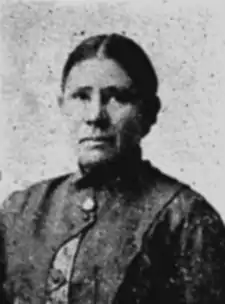Margarita Ortega (magonist)
Margarita Ortega Valdés (Sonora, 1871 – Mexicali, 23 November 1913)[1] was a Mexican weapons expert, markswoman, nurse, courier, spy,[2] and the best-known magonist woman soldier.[3] Ortega was born into a wealthy Sonoran family, headed by Dolores Valdés and Pablo Ortega. They moved to Baja California in 1891, where the following year, in Tecate, Ortega married Pascual Gortar. The couple had a daughter, Rosaura Gortari Ortega, before Pascual died. While Rosaura was still an infant, Ortega married again, to Manuel Demara, son of Antonio Demara of Tecate.[4] In 1911, Ortega became member of the Mexican Liberal Party in Baja California, participating in the armed revolt against Porfirio Díaz.[5] In 1913, the Mexican militia captured, tortured and killed Ortega.[6]

References
- Aragon Castillo, Olga Alicia (22 November 2009). "Merecen tres revolucionarias ser rescatadas del olvido". La Jornada (in Spanish). Universidad Nacional Autónoma de México. p. 27. Retrieved 21 September 2016.
- Keller, Gary D., ed. (2006). "Revolutionary Mexican Women in History and Film". Bold Caballeros and Noble Bandidas. Arizona State University. Retrieved 22 October 2023.
- Weber 2006, p. 466.
- Estrada Barrera, Enrique (6 March 2009). "Las mujeres de México y Baja California". Periodistas en línea (in Spanish). Mexico City, Mexico: UNAM.
- Flores Magón 2005, p. 228; Samaniego López 1999, p. 93.
- Tutino 2012, p. 221.
Bibliography
- Flores Magón, Ricardo (2005) [1914]. "Margarita Ortega". In Bufe, Chaz; Cowen Verter, Mitchell (eds.). Dreams of Freedom: A Ricardo Flores Magón Reader. Translated by Bufe, Chaz. AK Press. pp. 228–231. ISBN 1-904859-24-0. LCCN 2005929131.
- Samaniego López, Marco Antonio (1999). "El impacto del maderismo en Baja California, 1911" (PDF). Estudios de Historia Moderna y Contemporánea de México (in Spanish). 18: 89–120. ISSN 0185-2620. Archived from the original (PDF) on 9 July 2007.
- Tutino, John (15 May 2012). Mexico and Mexicans in the Making of the United States. University of Texas Press. ISBN 978-0-292-73718-1.
- Weber, Devra A. (2006). "Mexican Revolution, Border Women in". In Ruíz, Vicki; Sánchez Korrol, Virginia (eds.). Latinas in the United States: A Historical Encyclopedia. Vol. 2. Indiana University Press. pp. 464–466. ISBN 0-253-34683-5. LCCN 2005034986.
Further reading
- Abbott, Benjamin H. (2018). ""That Monster Cannot Be a Woman:" Queerness and Treason in the Partido Liberal Mexicano". Anarchist Developments in Cultural Studies. 2018 (1): 9–28. ISSN 1923-5615.
- Cockcroft, James D. (2010). "Mexicans Rise Up, 1910-2010: Similarities and Differences". Mexico’s Revolution: Then and Now. Monthly Review Press. pp. 13–34. ISBN 978-1-58367-224-2. LCCN 2010035832.
- Espino Becerril, Claudia (2015). "Mujeres Mexicanas Anarquistas". In Domínguez Prieto, Olivia (ed.). El Anarquismo en México (PDF) (in Spanish). pp. 147–167. ISBN 978-607-95645-9-9.
- Ellstrand, Nathan Kahn (2011). Las Anarquistas: The History of Two Women of the Partido Liberal Mexicano in Early 20th Century Los Angeles (MA). University of California. ProQuest 1495251.
- González, Gabriela (2018). Redeeming La Raza: Transborder Modernity, Race, Respectability, and Rights. Oxford University Press. ISBN 9780199914142. LCCN 2017056469.
- Guidotti-Hernández, Nicole M. (2019). "Partido Liberal Mexicano: Intimate Betrayals: Enrique Flores Magón, Paula Carmona, and the Gendered History of Denunciation". Southern California Quarterly. 101 (2): 127–162. doi:10.1525/scq.2019.101.2.127. ISSN 0038-3929.
- Guidotti-Hernández, Nicole M. (2021). Archiving Mexican Masculinities in Diaspora. Duke University Press. ISBN 9781478013242. LCCN 2020044111.
- López-Calvo, Ignacio (2008). "The Spanish-Language Crónica in Los Angeles: Francisco P. Ramírez and Ricardo Flores Magón" (PDF). Journal of Spanish Language Media. 1: 125–138. ISSN 1940-0810.
- Lozoya, Nallely (2023). "A Vision Without Borders: Magonismo and Mexican Women". Spectra Undergraduate Research Journal. 3 (1): 1–14. doi:10.9741/2766-7227.1023. ISSN 2766-7227.
- Milian, Alberto (2018). Under a Perfect Sun: Ethnic Mexicans and the Left in Greater San Diego, 1900-1950 (PhD). Cornell University. doi:10.7298/X4765CJ4.
- Miner, Dylan (2010). "Ortega, Margarita (?–1914)". In Ness, Immanuel (ed.). The International Encyclopedia of Revolution and Protest. Wiley. p. 1. doi:10.1002/9781405198073.wbierp1715. ISBN 9781405198073.
- Samaniego López, Marco Antonio (2007). "La revolución mexicana en Baja California: maderismo, magonismo, filibusterismo y la pequeña revuelta local". Historia Mexicana (in Spanish). 56 (4): 1201–1262. ISSN 0185-0172. JSTOR 25139752.
- Samaniego López, Marco Antonio (2010). "El norte revolucionario: Diferencias regionales y sus paradojas en la relación con Estados Unidos". Historia Mexicana (in Spanish). 60 (2): 961–1018. ISSN 0185-0172. JSTOR 25758292.
- Samaniego López, Marco Antonio (2020). "En contra del Programa del Partido Liberal Mexicano: los anarquistas del PLM" (PDF). Secuencia (in Spanish) (107). doi:10.18234/secuencia.v0i107.1716. ISSN 0186-0348.
- Struthers, David M. (2019). The World in a City: Multiethnic Radicalism in Early Twentieth-Century Los Angeles. University of Illinois Press. pp. 141–143.
- Turner, Ethel Duffy (1981). Devis, Rey (ed.). Revolution in Baja California: Ricardo Flores Magón’s High Noon. Detroit: Blaine Ethridge. pp. 66–67. ISBN 0879170786.
External links
- Cervantes, Erika (4 November 2003). "Margarita Ortega: a costa de la propia vida". Cimac (in Spanish). Archived from the original on 20 April 2008.
- Heath, Nick (1999). "Ortega, Margarita, ?-1914". Organise!. No. 51. Anarchist Federation – via Libcom.org.